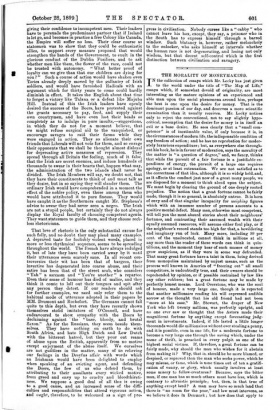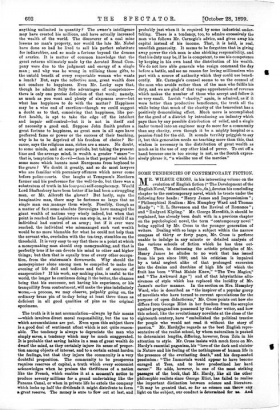THE MORALITY OF MONEYMAKING.
IN the collection of essays which Mr. Lecky has just given to the world under the title of "The Map of Life," essays which, if somewhat devoid of originality, are most interesting as the mature opinions of an experienced and able man upon the social phenomena around him, perhaps the best is one upon the desire for money. That is the dominant passion of our day, and deserves a more scientific examination than it usually receives. Mr. Lecky notices only to reject the conventional, not to say slightly hypo- critical, assumption that the desire for money is in itself an evil or a base desire. He sees clearly, that a "small com- petence" is of inestimable value, if only because it is, in the circumstances of modern life, the indispensable condition of any freedom of action; and he has no reprobation for moder- ately luxurious expenditure; but, as everywhere else through- out his book, he is in favour of moderation, says the morality of the matter is "a question of degree," and, we fancy, thinks that while the pursuit of a: fair fortune is a justifiable ex- penditure of energy, the pursuit of a large one requires apology, or at least extenuation. We are not satisfied as to the correctness of that idea, although it is so widely held, and, as it affects the conduct just now of a great many people, we are disposed for a moment to think aloud upon the subject. We must begin by clearing the ground of one deeply rooted prejudice. The notion that a great fortune cannot be fairly made, though it is so general, is absolutely untrue. It is born of envy and of that singular incapacity for weighing figures which with an immense number of persons amounts to a positive mental defect. Many men, otherwise most competent, will tell you the most absurd stories about their neighbours' fortunes, and contrasting their assumed wealth with their equally assumed resources, will assume either foul play, or if the neighbour's record stands too high for that, a bewildering and imaginary run of luck. Many more, including 99 per cent. of the uneducated, cannot think in millions at all, any more than the reader of these words can think in quin- tillions, and the moment they hear of such masses of money grow suspicious, as if they were in some way defrauded. That many great fortunes have a taint in them, being derived from monopolies maintained by unjust means, such as the process well known in America of "freezing out" all small competitors, is undoubtedly true, and their owners should be reprehended by opinion, or if possible restrained by law like any other robbers; but a great fortune may be made by perfectly honest means. Lord Overstone, who was the soul of honour, made a very large one, though it is reported that another millionaire reading his will expressed audible sorrow at the thought that his old friend had not been "more at his ease." Mr. Stewart, the draper of New York who left twenty millions, was perfeetly upright, and no one ever saw or thought that the Astors made their magnificent fortune by anything except forecasting judg- ment in investments. Indeed, if life lasted a little longer thousands would die millionaires without ever stealing a penny, and it is possible, even in one life, for a moderate fortune to become a very large one through the saving which, under the name of thrift, is preached in every pulpit as one of the highest social virtues. If, therefore, a great fortune can be fairly made, why should the man who wishes for it abstain from making it ? Why, that is, should he be more blamed, or despised, or reproved than the man who seeks power, which he may misuse, or fame, which is nine times out of ten a gratifi- cation of vanity, or glory, which usually involves at least some misery to fellow-creatures ? Because, says the bitter man, if one man has so much others must have less, which is contrary to altruistic principle; but, then, is that true of anything except land ? A man may have so much land that there is "no room for the poor," and law must intervene, as we believe it does in Denmark ; but how does that apply to anything unlimited in quantity ? The owner's intelligence may have created his millions, and have actually increased the wealth of the world. The discoverer of a coal mine lessens no man's property, nor would the late Mr. Nobel have done so had be lived to sell his perfect substitute for indiarubber, and so made a fortune beyond the dreams of avarice. It is matter of common knowledge that the great returns ultimately made by the Aerated Bread Com- pany were due to the judgment and energy of a single man ; and why was he wrong in utilising those gifts, to the untold benefit of every respectable woman who wants a lunch ? But, says the reflective man, great wealth does not conduce to happiness. Even Mr. Lecky says that, though he admits fully the advantages of competence— there is only one precise definition of that word ; namely, as much as you want and plenty of sixpences over—but what has happiness to do with the matter ? Happiness may be a wise end of exertion—though we could suggest a doubt as to that, conceiving that happiness, like per- fect health, is apt to take the edge off the intellect and impair self-control—but it is not in itself and of necessity a good end. Suppose John Smith prefers a great fortune to happiness, as great men in all ages have preferred fame or power or the success of their teaching, why is he to be deprived of his freedom of choice ? Be- cause, says the religious man, riches are a snare. No doubt, to some minds, and at some periods, but taking the present time and the average mind, is wealth a greater " snare "— that is, temptation to do evil—than is that perpetual wish for some more which haunts most Europeans from boyhood to the grave ? We doubt it greatly, and so do most lawyers who are familiar with pecuniary offences which never come before police-courts. One laughs at Tennyson's Northern farmer and his preference for the well-to-do, but there was a substratum of truth in his bourgeois self-complacency. Would Lord Shaftesbury have been better if he had been a struggling man, or Mr. Allcroft the glover ? But lastly, says the imaginative man, there may be fortunes so large that no single man can manage them wisely. Possibly, though as a matter of fact some absolute Sovereigns have managed the giant wealth of nations very wisely indeed, but when that point is reached the Legislature can step in, as it would if an individual had control of an army ; but if it ever were reached, the individual who mismanaged such vast wealth would be no more blamable for what he could not help than the servant who, overladen with the tea-tray, stumbles on the threshold. It is very easy to say that there is a point at which a moneymaking man should stop moneymaking, and that is perfectly true if he can devote his mind to other and higher things; but then that is equally true of every other occupa- tion, from the statesman's downwards. Why should the moneyspinner alone among men be compelled to make the evening of life dull and tedious and full of sources of
exasperation If his work, say making pine, is useful to the world, the longer he continues doing it the better, the chances being that his successor, not having his experience, or his tranquillity from contentment, will make the pins indefinitely worse,—a process, we may observe, palpably going on, the ordinary brass pin of to-day being at least three times as deficient in all good qualities of pins as the original specimens.
The truth is it is not accumulation—always by fair means —which involves direct moral responsibility, but the use to which accumulations are put. Even upon this subject there is a good deal of sentiment afloat which is not quite reason- able. The tendency is always to depreciate the man who simply saves, a tendency which may be much exaggerated. It is probable that saving habits in a man of great wealth do dwarf the mind, as they certainly injure its sense of propor- tion among objects of interest, and to a certain extent harden the feelings, but that they injure the community is a very doubtful proposition. The community to be prosperous requires reserves of capital, a truth which every economist acknowledges when he praises the thriftiness of a nation like the French, which enables it at a moment's notice to produce seventy millions for a grand undertaking like the Panama Canal, or when in private life he extols the company which locks up half the dividends it might distribute to form a great reserve. The money is sure to flow out at last, and
probably just when it is required by some industrial under. taking. There is a tendency, too, to admire excessively the man who follows Mr. Carnegie's advice, and gives away his capital instead of his income. That, it is held, is real, unselfish generosity. It seems to be forgotten that in giving away power the rich man is also shirking responsibility, and that his duty may be, if he is competent, to use his competence by keeping in his own hand the distribution of his wealth. We do not love able generals who resign command the day before a battle, and see no reason for loving millionaires who part with a source of authority which they could use benefi- cently. Mr. Carnegie's counsel seems to us the counsel of the man who avoids rather than of the man who fulfils his duty, and we are glad of that vague apprehension of reverses which makes the number of those who accept and follow it so very small. Lavish "charity," again, is admired, as if it were better than productive beneficence, the truth all the while being that much of the charity of the benevolent has a positively demoralising effect. Much more is accomplished for the good of a district by introducing an industry which pays than by any possible distribution of relief, and a single loafer turned into an engineer may do more for a community than any charity, even though it be a mighty hospital or a pension-fund for the old. It sounds terribly priggish to say it, but this generation needs no teaching more than this, that wisdom is necessary in the distribution of great wealth as much as in the use of any other kind of power. To cut off a hand because one is too strong is not, as the Scotch expres- sively phrase it, "a wiselike use of the mercies."







































 Previous page
Previous page